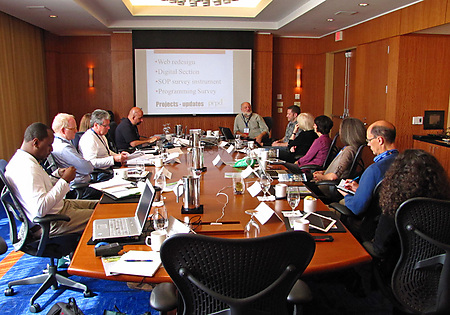Deaf Life11th October 2015
Should Deaf Equality Really be so Limited in Scope
People with a commercial interest often sacrifice true Deaf Equality for personal influence or financial gain

At the PizzaBar in Newport, California, Deaf diners now have the opportunity to order their food through remote interpreters, a service provided by the Language People Interpreter Service. It is not the first restaurant to offer this service, access to remote interpreters via the internet a fast growing trend, but it is still newsworthy, with the story about the steps being taken by the restaurant covered by the Daily Pilot.
The first Deaf diners to use the service are reported to have been reduced to tears as they were able to ‘order water with a lemon wedge’ through the interpreter.
 It’s a simple concept, as Tom Gruenbeck, an Attorney for Language People demonstrated, by pushing a large green button labelled ‘interpreter’ on a tablet computer, which connected him to an interpreter. She then took his signed order and told the restaurant staff what he wanted. All sorted.
It’s a simple concept, as Tom Gruenbeck, an Attorney for Language People demonstrated, by pushing a large green button labelled ‘interpreter’ on a tablet computer, which connected him to an interpreter. She then took his signed order and told the restaurant staff what he wanted. All sorted.
What caught my attention, was the headline to the article and the overly positive reporting of the story. “Newport restaurant first to become certified as deaf-friendly”, accompanied by comments from Mr Gruenbeck that, “This provides true equality” for the deaf community. Really? It’s a small progressive step and I commend the restaurant owner Gary Decker for making it, but do they seriously think having on-line access to an interpreter to order food, is all it takes to provide ‘true equality.’ Is that the standard in America and the extent of the requirements in the legislation?
 Interestingly, the certification of the restaurant as being deaf friendly, is also done by the interpreter agency providing the service, making the whole thing just a little self congratulating and lacking the external deaf-led assessment that would perhaps make this more sustainable. To say the ‘deaf-friendly’ bar was set very low in respect of adaptations that lead to ‘deaf equality’ is an under-statement. I have no criticism of Mr Decker or restaurateurs and other business people who introduce these systems, that is progress, but I am critical of those that decide for swathes of other deaf people, that these small steps lead to ‘deaf equality’ in all but one of the many parts of the restaurant or service experience. They don’t.
Interestingly, the certification of the restaurant as being deaf friendly, is also done by the interpreter agency providing the service, making the whole thing just a little self congratulating and lacking the external deaf-led assessment that would perhaps make this more sustainable. To say the ‘deaf-friendly’ bar was set very low in respect of adaptations that lead to ‘deaf equality’ is an under-statement. I have no criticism of Mr Decker or restaurateurs and other business people who introduce these systems, that is progress, but I am critical of those that decide for swathes of other deaf people, that these small steps lead to ‘deaf equality’ in all but one of the many parts of the restaurant or service experience. They don’t.
This story is far from unique with many examples of businesses seeking a commercial benefit, quick to sacrifice ‘true deaf equality’, for the sake of an extra pound or dollar going into their pocket. Sadly, these businesses are often hearing-led, although this is not exclusively the case.
For years, people within the Deaf community have been made to feel grateful for the endeavours of well-intentioned hearing people, who lead Deaf charities, Deaf organisations, deaf education or run sign language courses. Told hundreds of times, over more than two decades, that these people were trying to help and were speaking for us, I look back now and wonder what the outcome of those intentions and the millions of pounds spent are. What difference has really been made.
 Despite all of this costly activity, most deaf-focused organisations are led and run by hearing staff. Empowerment has not been achieved, and I still attend events, when tokenism by mainstream organisations and tiny incremental steps win national awards and we are all expected to sit and applaud and feel grateful. Many of those organisations consider it job well done when recognition like this is done, and rarely over the last 25 years have they then moved things up a gear – towards real Deaf Equality.
Despite all of this costly activity, most deaf-focused organisations are led and run by hearing staff. Empowerment has not been achieved, and I still attend events, when tokenism by mainstream organisations and tiny incremental steps win national awards and we are all expected to sit and applaud and feel grateful. Many of those organisations consider it job well done when recognition like this is done, and rarely over the last 25 years have they then moved things up a gear – towards real Deaf Equality.
The restaurant in Newport is no exception, the aim is to get legally compliant with the Americans with Disabilities Act. It’s not about doing something that completely changes and enhances the whole dining experience so that I can easily order follow on drinks, ask about the wine, ask about the preparation of the food, have a normal interaction with the waiter or waitress about their life and what they hope to achieve, or enjoy other small talk. It’s about doing the least they can get away with. Just so long as I can order food in sign language, they are deaf friendly right. Wrong!!
 Far more important than that is the attitude of staff, their awareness of all Deaf and Hard of Hearing people, not just the signing community. Being able to communicate, which is not limited to voice or sign, it could be gesture, pointing, facial expression, mime, any number of things, are all essential to me getting equality.
Far more important than that is the attitude of staff, their awareness of all Deaf and Hard of Hearing people, not just the signing community. Being able to communicate, which is not limited to voice or sign, it could be gesture, pointing, facial expression, mime, any number of things, are all essential to me getting equality.
The problem with hearing-led change, no matter how well intentioned, is that it invariably fails to understand the day to day, hour by hour, minute by minute, minutia of real deaf life experiences. It lacks depth of understanding, the Deaf background, Deaf education, isolation, trust, the impact of false promises and much, much more. Most importantly, it fails to dream big about true Deaf Equality, a world in which deaf people are given parity and where deaf people are supported to achieve and take over themselves and truly reach their potential.
 At some point in the future we will look back and see that deaf people have been and are still being suppressed by processes and people, including many of the ‘well-intentioned’ hearing people who tell us that they all work slavishly day and night fighting for deaf people. Some do, but all, the majority? If they have been, why aren’t there more deaf people now leading organisations, leading change, teaching deaf youngsters and leading on policy.
At some point in the future we will look back and see that deaf people have been and are still being suppressed by processes and people, including many of the ‘well-intentioned’ hearing people who tell us that they all work slavishly day and night fighting for deaf people. Some do, but all, the majority? If they have been, why aren’t there more deaf people now leading organisations, leading change, teaching deaf youngsters and leading on policy.
 Where are the independent culturally deaf thinkers involved in advising and formulating the national policies that impact on our daily lives. Where are the individuals who have not been institutionalised or have so much at stake they can no longer, ‘Think Deaf’, or think ‘Deaf Community,’ for fear of losing their power, influence or income? Where are the unsullied and energetic youngsters who have no baggage and are brimming with drive and ambition, people who could bring about beneficial change in my lifetime.
Where are the independent culturally deaf thinkers involved in advising and formulating the national policies that impact on our daily lives. Where are the individuals who have not been institutionalised or have so much at stake they can no longer, ‘Think Deaf’, or think ‘Deaf Community,’ for fear of losing their power, influence or income? Where are the unsullied and energetic youngsters who have no baggage and are brimming with drive and ambition, people who could bring about beneficial change in my lifetime.
 I used to be naïve when it came to being sucked in by the proliferation of good intentions, but attending a series of ‘Deaf Events’ and having discussions in the margins with the hearing leaders on Deaf Policy, that has now changed. For me the future is about real change, true deaf equality and the fight for transparent accountability for the spend of huge sums of money, money designed to change real life experiences.
I used to be naïve when it came to being sucked in by the proliferation of good intentions, but attending a series of ‘Deaf Events’ and having discussions in the margins with the hearing leaders on Deaf Policy, that has now changed. For me the future is about real change, true deaf equality and the fight for transparent accountability for the spend of huge sums of money, money designed to change real life experiences.
Article by Sarah Lawrence, Editor
posted in Community / Deaf Life
11th October 2015





